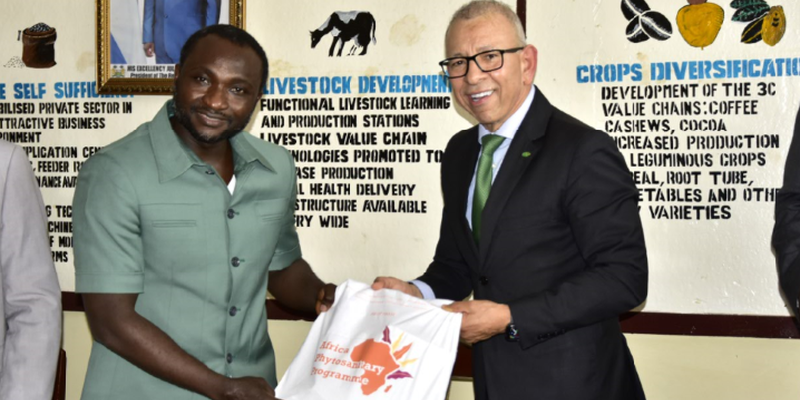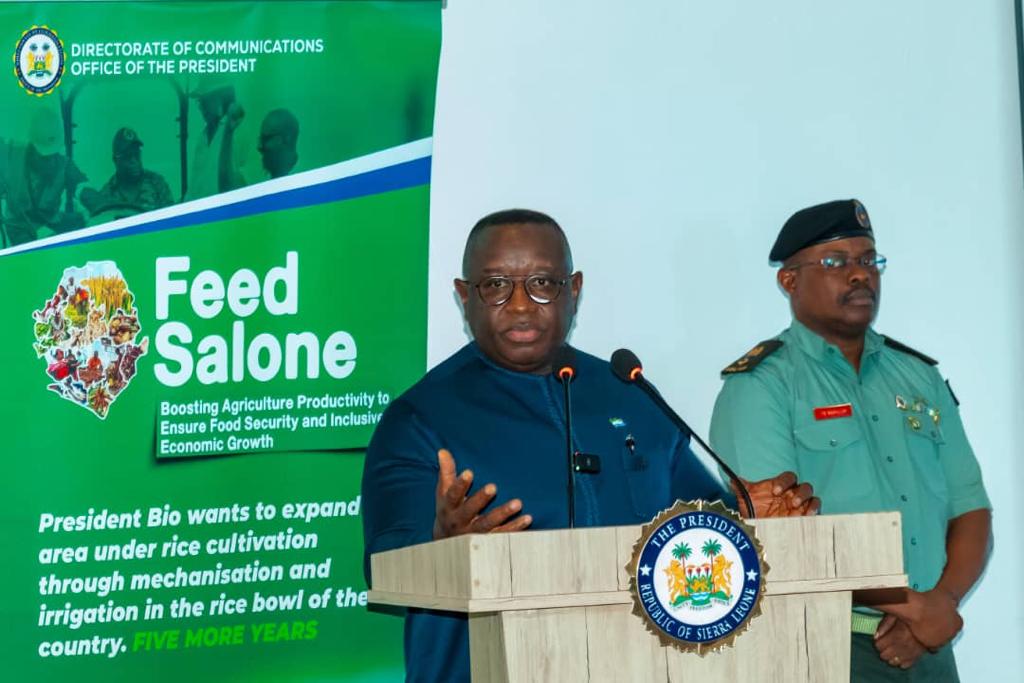By:
Yusuff Moseray Suma
The 'Feed
Salone' initiative, championed by His Excellency President Julius Maada Bio, is
a cornerstone of Sierra Leone's agricultural policy. It seeks to address food
security by empowering local farmers and increasing agricultural productivity.
However, recent events in the Makarie Chiefdom have cast a shadow over this
noble initiative, highlighting the challenges that can arise when local
interests clash with national goals.
The 'Feed
Salone' initiative is more than just an agricultural program; it is a vision
for a self-sufficient Sierra Leone. At its core, the initiative aims to reduce
the country's dependency on imported food by boosting local food production.
This is achieved through a combination of government support, community
involvement, and the empowerment of local farmers, particularly women, who make
up a significant portion of the agricultural workforce.
Key
Advantages of the 'Feed Salone' Initiative:
- Empowerment of Local
Farmers: The
initiative places significant emphasis on empowering local farmers by
providing them with the necessary tools, resources, and training to
improve their productivity. By focusing on capacity-building, 'Feed
Salone' enables farmers to increase their yields, improve the quality of
their produce, and ultimately, enhance their livelihoods.
- Reduction of Food
Insecurity: One
of the primary objectives of 'Feed Salone' is to address food insecurity
by ensuring that Sierra Leone can produce enough food to meet the needs of
its population. By reducing reliance on imported food, the initiative
helps stabilize food prices and makes essential staples more affordable
for the average Sierra Leonean.
- Economic Growth and
Sustainability: The
success of 'Feed Salone' is directly linked to the broader economic
development of the country. By promoting local food production, the
initiative supports the growth of the agricultural sector, creates jobs,
and stimulates economic activity in rural areas. This, in turn,
contributes to the overall sustainability and resilience of the national
economy.
- Environmental Stewardship: The initiative encourages
sustainable farming practices that are designed to protect the environment
and preserve natural resources. By promoting methods that reduce soil
degradation, conserve water, and enhance biodiversity, 'Feed Salone'
ensures that the agricultural sector can thrive in the long term without
compromising the environment.
- Community Cohesion: 'Feed Salone' fosters a sense of community and shared purpose among local farmers. By working together towards a common goal, farmers are able to share knowledge, support one another, and build stronger, more resilient communities.
Rice is a
staple crop in Sierra Leone, and its production is crucial to the success of
'Feed Salone'. The destruction of these farms represents a significant setback,
not only for the farmers involved but also for the broader community that
depends on these crops for food and income.
For the
women farmers of Mayobo, Moria, Makaray, and Makarie, farming is more than just
a job; it is a way of life. Many of these women have been cultivating the land
for generations, passing down knowledge and skills from mother to daughter. The
rice farms they tend to are not just sources of food and income, but also
symbols of their heritage and resilience.
The
destruction of their farms has left these women devastated. Many have lost
their entire crop, which they had hoped to harvest and sell to support their
families. For some, this loss means the difference between being able to send
their children to school or not. For others, it means the loss of their only
source of income.
Despite
the enormity of their loss, these women remain resilient. Their protest was not
just a cry for help, but a demand for justice. They are calling on local
authorities to hold Dawoh accountable and to take measures to prevent such
incidents from happening in the future.
The
actions of a single individual can have far-reaching consequences, particularly
when they undermine national initiatives like 'Feed Salone'. The destruction of
these rice farms is not just a local issue; it is a national concern. When
local interests are allowed to override the common good, it jeopardizes the
progress that has been made towards achieving food security in Sierra Leone.
President
Bio's administration has made significant strides in promoting agriculture as a
key driver of economic growth. However, incidents like the one in Makarie
Chiefdom threaten to derail these efforts. It is crucial that the government,
local authorities, and communities work together to ensure that the gains made
under 'Feed Salone' are not lost.
The
incident in Makarie Chiefdom serves as a reminder of the challenges that lie
ahead. Achieving food security in Sierra Leone will require not only government
support but also the active participation and cooperation of local communities.
It will require holding individuals accountable when their actions threaten the
common good and ensuring that all stakeholders are aligned with the national
agenda.
As Sierra
Leone continues to strive towards self-sufficiency, it is important to remember
that the success of initiatives like 'Feed Salone' depends on the collective
efforts of all citizens. By working together, we can build a stronger, more
resilient nation, where every citizen has the opportunity to thrive.
 |
| Henry Musa Kpaka (left), Sierra Leone’s Minister of Agriculture and Food Security, receives APP materials from Osama El-Lissy (right) IPPC Secretary / © FAO/Anita Tibasaaga |
The 'Feed
Salone' initiative is a bold and visionary project that has the potential to
transform Sierra Leone's agricultural landscape. However, its success hinges on
the ability of local communities to align with national goals and work together
towards a common purpose. The recent incident in Makarie Chiefdom is a stark
reminder of the challenges that lie ahead, but it is also an opportunity for
reflection and action.

















0 Comments